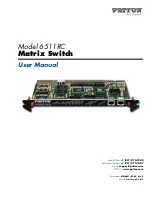
C
HAPTER
14
| Basic Administration Protocols
Simple Network Management Protocol
– 454 –
Managed devices supporting SNMP contain software, which runs locally on
the device and is referred to as an agent. A defined set of variables, known
as managed objects, is maintained by the SNMP agent and used to manage
the device. These objects are defined in a Management Information Base
(MIB) that provides a standard presentation of the information controlled
by the agent. SNMP defines both the format of the MIB specifications and
the protocol used to access this information over the network.
The switch includes an onboard agent that supports SNMP versions 1, 2c,
and 3. This agent continuously monitors the status of the switch hardware,
as well as the traffic passing through its ports. A network management
station can access this information using network management software.
Access to the onboard agent from clients using SNMP v1 and v2c is
controlled by community strings. To communicate with the switch, the
management station must first submit a valid community string for
authentication.
Access to the switch from clients using SNMPv3 provides additional security
features that cover message integrity, authentication, and encryption; as
well as controlling user access to specific areas of the MIB tree.
The SNMPv3 security structure consists of security models, with each
model having it’s own security levels. There are three security models
defined, SNMPv1, SNMPv2c, and SNMPv3. Users are assigned to “groups”
that are defined by a security model and specified security levels. Each
group also has a defined security access to set of MIB objects for reading
and writing, which are known as “views.” The switch has a default view (all
MIB objects) and default groups defined for security models v1 and v2c.
The following table shows the security models and levels available and the
system default settings.
Table 30: SNMPv3 Security Models and Levels
Model Level
Group
Read View
Write View
Notify View Security
v1
noAuthNoPriv public
(read only)
defaultview
none
none
Community string only
v1
noAuthNoPriv private
(read/write)
defaultview
defaultview
none
Community string only
v1
noAuthNoPriv
user defined user defined
user defined
user defined
Community string only
v2c
noAuthNoPriv public
(read only)
defaultview
none
none
Community string only
v2c
noAuthNoPriv private
(read/write)
defaultview
defaultview
none
Community string only
v2c
noAuthNoPriv
user defined user defined
user defined
user defined
Community string only
v3
noAuthNoPriv
user defined user defined
user defined
user defined
A user name match only
v3
AuthNoPriv
user defined user defined
user defined
user defined
Provides user authentication via MD5 or
SHA algorithms
v3
AuthPriv
user defined user defined
user defined
user defined
Provides user authentication via MD5 or
SHA algorithms and data privacy using
DES 56-bit encryption
Summary of Contents for ECS3510-10PD
Page 1: ...Management Guide www edge core com 10 Port Layer 2 Fast Ethernet Switch...
Page 2: ......
Page 4: ......
Page 48: ...CONTENTS 48...
Page 68: ...SECTION I Getting Started 68...
Page 78: ...CHAPTER 1 Introduction System Defaults 78...
Page 96: ...CHAPTER 2 Initial Switch Configuration Managing System Files 96...
Page 98: ...SECTION II Web Configuration 98...
Page 118: ...CHAPTER 3 Using the Web Interface Navigating the Web Browser Interface 118...
Page 150: ...CHAPTER 4 Basic Management Tasks Resetting the System 150...
Page 196: ...CHAPTER 5 Interface Configuration VLAN Trunking 196 Figure 66 Configuring VLAN Trunking...
Page 238: ...CHAPTER 7 Address Table Settings Configuring MAC Address Mirroring 238...
Page 264: ...CHAPTER 8 Spanning Tree Algorithm Configuring Interface Settings for MSTP 264...
Page 274: ...CHAPTER 9 Congestion Control Automatic Traffic Control 274...
Page 288: ...CHAPTER 10 Class of Service Layer 3 4 Priority Settings 288...
Page 304: ...CHAPTER 11 Quality of Service Attaching a Policy Map to a Port 304...
Page 424: ...CHAPTER 13 Security Measures DHCP Snooping 424...
Page 568: ...CHAPTER 14 Basic Administration Protocols OAM Configuration 568...
Page 596: ...CHAPTER 15 IP Configuration Setting the Switch s IP Address IP Version 6 596...
Page 614: ...CHAPTER 1 IP Services Configuring the PPPoE Intermediate Agent 614...
Page 784: ...CHAPTER 20 System Management Commands Powered Device 784...
Page 814: ...CHAPTER 22 Remote Monitoring Commands 814...
Page 1008: ...CHAPTER 26 Interface Commands Power Savings 1008...
Page 1022: ...CHAPTER 27 Link Aggregation Commands Trunk Status Display Commands 1022...
Page 1052: ...CHAPTER 29 Congestion Control Commands Automatic Traffic Control Commands 1052...
Page 1064: ...CHAPTER 31 UniDirectional Link Detection Commands 1064...
Page 1070: ...CHAPTER 32 Address Table Commands 1070...
Page 1130: ...CHAPTER 34 ERPS Commands 1130...
Page 1172: ...CHAPTER 35 VLAN Commands Configuring Voice VLANs 1172...
Page 1186: ...CHAPTER 36 Class of Service Commands Priority Commands Layer 3 and 4 1186...
Page 1302: ...CHAPTER 38 Multicast Filtering Commands MVR for IPv6 1302...
Page 1368: ...CHAPTER 40 CFM Commands Delay Measure Operations 1368...
Page 1390: ...CHAPTER 42 Domain Name Service Commands 1390...
Page 1448: ...CHAPTER 44 IP Interface Commands ND Snooping 1448...
Page 1450: ...SECTION IV Appendices 1450...
Page 1455: ...APPENDIX A Software Specifications Management Information Bases 1455 UDP MIB RFC 2013...
Page 1456: ...APPENDIX A Software Specifications Management Information Bases 1456...
Page 1482: ...COMMAND LIST 1482...
Page 1493: ......
















































